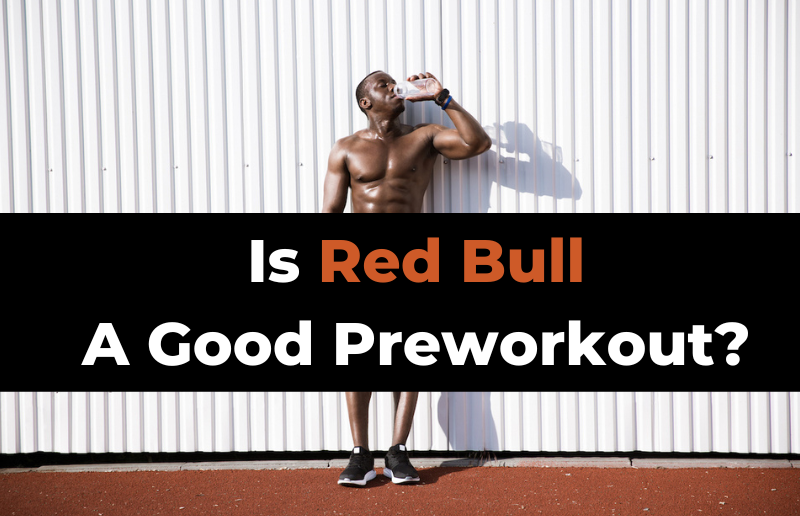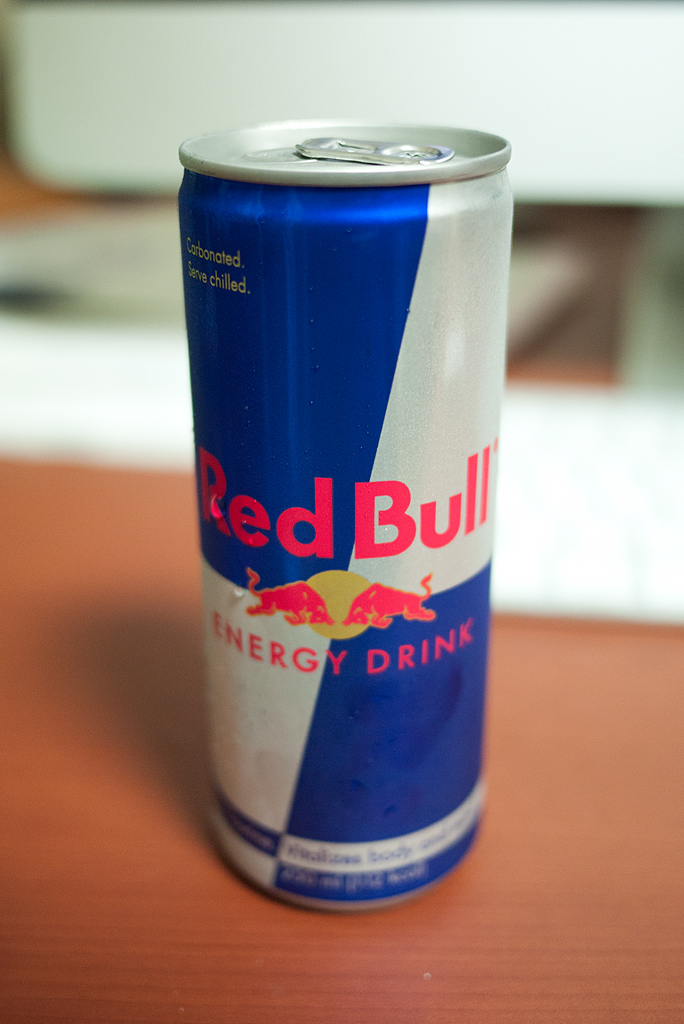While some people just have that natural “pep in their step” and are ready to hit the gym (or wherever you workout) at any time of the day, others need a little “pick me up”.
To get the most out of your workout, pre-workout drinks are formulated with a calculated mix of caffeine, carbohydrates, creatine, amino acids, beta-alanine, nitrates, L-arginine, and vitamins.
Just as some need a cup of coffee or even a can of Coke to start their workday, those hitting the gym are also looking for a quick pre-workout beverage to kickstart their session.
With countless options for pre-workout drinks and powders on the shelves, one option that some people have turned to is Red Bull.
Despite the fact that, no, Red Bull will not literally “give you wings”, a lot of gym-goers find themselves wondering:
Is Red Bull a good pre-workout? Can I use Red Bull instead of a regular pre-workout like C4?

Red Bull is an acceptable substitute for pre-workout in a pinch. The caffeine in Red Bull will certainly wake you up and help you feel alert and energized in the gym. However, pre-workouts drinks are superior in the way they delivery energy and help avoid the “crash,” and they usually contain extra ingredients that improve performance and recovery — while Red Bull only offers quick energy.
Also of note, the carbonation in Red Bull can leave you feeling bloated or gassy in the gym, which is not ideal! And full sugar Red Bull adds unnecessary and un-nutritious calories to your diet, “offsetting” some of your hard work.
Let’s take a closer look at the ingredients and the pros and cons of using Red Bull as a pre-workout.
What’s the difference between energy drinks and pre-workouts?
The biggest difference between an energy drink such as Red Bull and a pre-workout drink is their purpose.
While both have a caffeine component, the goal of an energy drink is to give you an instant wake-up kick in the butt, whereas pre-workouts are designed to improve your athletic performance as well as give you a boost of energy.
(How long before a workout should you drink Red Bull? As soon as possible! Drink it right before the gym to maximize its energy effects.)
Energy drinks which contain a high sugar content, vitamins, and amino acid derivatives are often extremely high in caffeine and designed to give you a short-term boost of energy.
In contrast, pre-workout drinks are specially formulated to have a slower release and longer-lasting effect.
Pre-workouts also contain other ingredients and supplements that help with performance and recovery.
Some energy drinks share similar ingredients to pre-workout formulas but in different volumes or proprietary blends.
Read labels carefully to ensure you know what you’re drinking.
What do studies show about the effects of energy drinks like Red Bull on a workout?

While Red Bull navigates itself around the question of how it should be used for sports and workouts, the company does promote that it is not a thirst quencher and does not re-hydrate.
Red Bull is primarily a caffeine delivery system. So… will caffeine help your workout?
Although some studies have shown that the correct amount of caffeine may improve your workout endurance, muscle strength, and mental performance, it must be taken in moderation to avoid any issues.
Still, don’t expect major improvements. Caffeine, and pre-workout drinks in general, are not necessary for training and studies are mixed on their effectiveness.
The extra energy and alertness you get from caffeine might make you feel like you’re having better workouts (and you may just enjoy the feeling, which is fine!) but it’s likely mostly a placebo.
While one can of Red Bull (or similar energy drink) will probably not have major effects on your workouts, taking them daily will certainly impact your health and performance levels… negatively.
According to one report, repeated consumption of energy drinks before working out increases stress and aggression levels, elevates blood pressure, increases the risk of type 2 diabetes, and causes stomach irritation.
100ml of Red Bull contains just over 30mg of caffeine, which by itself is harmless, however since most places sell the drink in 8.4 Fl Oz, 12 Fl Oz, 16 Fl Oz, or 20 Fl Oz, that equates to 77.4mg, 110.7mg, 147.6mg or 170.1mg.
When you add that to any other substances that you have ingested with caffeine (morning coffee, lunchtime soda) you could be reaching a dangerous health level according to the FDA.
The International Society of Sports Nutrition states that a small volume of caffeine can help to improve your exercise performance, but high doses can have negative side effects.
So for health reasons, you’d probably want to avoid having Red Bull every single day, even if using it as a pre-workout.
(If you’re looking for a low-caffeine pre-workout, read this.)
Red Bull ingredients explained vs pre-workout drinks
Here’s what’s inside a can of Red Bull:
- Carbonated Water
- Sucrose
- Glucose
- Citric Acid
- Taurine
- Sodium Bicarbonate
- Magnesium Carbonate
- Caffeine
- Niacinamide
- Calcium Pantothenate
- Pyridoxine HCI
- Vitamin B12
- Natural and Artificial Flavors & Colors.
Most people will recognize about half of the ingredients found in a can of Red Bull, but when it comes to which ones help or hurt your workout and health, some people may not be as aware.
The glucose and sucrose give a combined 27 grams of sugar in each can (depending on the size of the can).
For those who prefer the sugar-free option, you are intaking aspartame, acesulfame K, and sucralose.
Keep in mind that full-sugar Red Bull adds additional calories to your diet without any nutritional value, which is less than ideal when you’re working out.
The combination of caffeine, taurine (found naturally in meat, fish, and dairy products), B-Vitamins, and sugar provide you with a quick boost of energy, which could help your workout in the short term, but leave you in a “crashed” state after a forty to sixty-minute period.
The acidity found in energy drinks such as Red Bull can potentially negatively impact your bone, muscle, and brain health when consumed in excess amounts.
Add in the fact that Red Bull is a carbonated beverage, which can leave you feeling bloated and potentially having gas, neither of which is enjoyable during a workout (for both you and the people around you).
Most energy drinks such as Red Bull share the same ingredients found in pre-workout, it’s just the volume of those ingredients that differ.
However, here are some ingredients in popular pre-workouts that Red Bull doesn’t have:
- Beta-Alanine
- Betaine Anhydrous
- Branched-Chain Amino Acids
- Citrulline Malate
- Creatine
- L-Theanine
These ingredients provide a mix of increased and improved blood flow, muscular endurance, recovery, alertness and focus, and delayed fatigue.
When you look at the ingredients, it becomes obvious why pre-workouts are formulated the way they are, and why they’re a superior choice for working out vs energy drinks like Red Bull.
Wrapping Up & Overall Recommendation
So after all of that, the question is, is Red Bull a good pre-workout drink? The answer is, that it depends.
Yes, Red Bull provides you with an increased level of energy, focus, and alertness quickly and it can certainly be used in a pinch if you forget your pre-workout mix, but it does not offer the same supplements that will help maximize your workout experience.
The energy from caffeine in Red Bull is likely quick and fleeting, and may leave you crashing halfway through your workout. Pre-workouts offer a blend of energy supplements designed for slower release and no crash.
Red Bull is also carbonated, which can leave you feeling bloated, and may contain unnecessary sugar and calories.
Red Bull is a fine pre-workout once in a while, but relying on it day in and day out at the gym isn’t ideal. Find a good pre-workout you like, instead, for better results.
(Here’s a review of C4 and C4 sport, two of the most popular pre-workouts on the market.)
And for more, read:
Hope this helps!